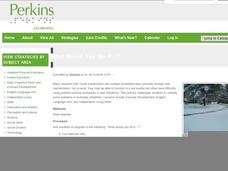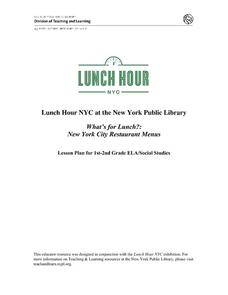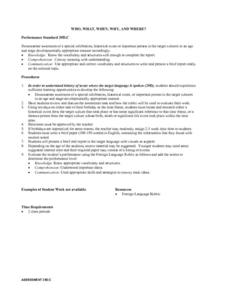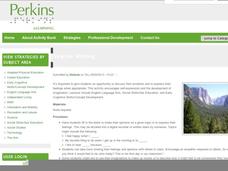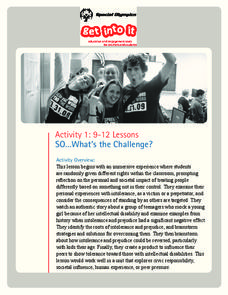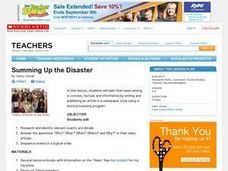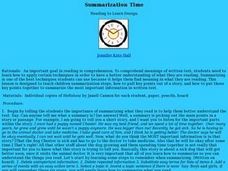Perkins School for the Blind
What Would You Do If...?
What would you do if...? That's a great question, and, when posed to learners with visual impairments, a question that can foster concept development and speaking and problem-solving skills that relate to real-life situations. The...
Curated OER
Wh Questions (Who, What, Where, When)
For this question words worksheet, students write the appropriate WH question for the underlined word in the first 8 sentences. Students then write the appropriate WH question that will have the stated sentence as an answer for the 5...
Curated OER
Worksheet 1: Question Words
While this activity is short, it provides a quick review of forming sentences using who, what, where, when and why. This 6 question activity could be used in an elementary class or with ESL students.
New York Public Library
What's for Lunch?: New York City Restaurant Menus
Do you remember the days when a cup of coffee cost five cents? At A.W. Dennett restaurant in 1894, you could buy a five-cent cup of coffee and as well as a five-cent slice of pie to accompany it. The menu from that year is a primary...
Curated OER
Question Words
In this conversation learning exercise, students each complete one question. Then, students circulate the classroom and ask each other their questions.
Curated OER
Questions or Statements?
Students are introduced to the six question words of who, what, when, where, why and how. After being read a story, they are asked who and what the story was about. To end the lesson, they practice identifying questions and statements.
Curated OER
History Repeats Itself
Students read about an event that occurred 140 years ago to ascertain
information (who? what? when? where? why?) and to compare this event to Rosa Parks arrest almost 50 years ago. They retell the story from your point of view.
Curated OER
Who, What, When, Why, And Where?
Students identify and more completely research a historical event that coincides with their own birthday. They then write a report about the event or a person whose birth, death, or life took place within that same timespan and/or...
Curated OER
Who is the Expert? Exploring Credible Sources in Healthcare
How do you decide what sources are credible when researching online? Evaluate sources with a focus on researching health issues. After brainstorming common health concerns and how they would try to diagnose these problems, class members...
Curated OER
The Great Depression and Everyday Life
Examine everyday life during the Great Depression, as well as the effects if the Depression on American population, society, and economy. Learners write who, what, where, when, and why summaries of a person who relocated to California...
Curated OER
What Did Henry Do Each Day?
King Henry was a very busy man, he had to sign documents and go hunting. Kids are presented with three slides and asked to choose the activities they think Henry engaged in each day. They then read to discover what Henry actually did...
Student Handouts
The Five W's and How
Here is a great graphic organizer for ensuring that young researchers and writers cover all their bases when brainstorming a topic by considering the five W's (who, what, where, when, and why) and how.
Perkins School for the Blind
Encouraging Students Who are Blind or Visually Impaired to Express Their Feelings and Explore Imagination
Being expressive in a creative, empathetic, or imaginative way is not only fun, it builds good pre-writing and communication skills. Learners with visual impairments have a roundtable discussion session where several sentence frames are...
Curated OER
Lesson 12: What Reasonable Conclusions are Possible?
Oftentimes, we jump to conclusions when we are given a limited amount of information. Take a look at reasonable conclusions with your communications studies class. If-clauses, dichotomous thinking, and assumptions are all covered with...
Curated OER
What Makes a Novel a Novel?
They always say to write what you know. This approach is used to get middle schoolers prepared to write novels of their own. Using a favorite book as a model, potential novelists respond to prompts that ask about characters, plot, main...
Special Olympics
SO…What’s the Challenge?
What does it feel like to be the victim of intolerance? Class members engage in activities, watch a video, and reflect on their own experiences with intolerance or discrimination before creating a project designed to combat intolerance...
Curated OER
Summing the Disaster
Students assume the role of a newspaper editor during the time of the Titanic disaster. They must search out the accurate answers to the questions: What? When? Where? Who? and Why? students then write their own newspaper article...
Curated OER
Patience
First graders listen to the story New Shoes for Silvia by Johanna Hurwitz. In this literacy instructional activity, 1st graders do a picture walk and answer who, what, when, where and why questions. Students answer multiple questions...
Curated OER
When Turtle Grew Feathers
Students explore the theme of friendship as it relates to the story When Turtle Grew Feathers. In this friendship lesson plan, students discuss friendship, answer comprehension questions, and create their own friendship story.
Curated OER
Who are the Greeks?
Who are the Greeks and where did they come from? Answer this and many other interesting questions related to Greek origins. You'll expose your class to the Minoan, Mycenaeans, and Dorians. Then they'll uncover how those three cultures...
Worksheet Web
Interrogatives and Auxiliary Verbs
Interrogatives—who, what, where, when, why, and how—are the focus of a grammar activity that reinforces writing questions and using auxiliary verbs.
Anne Frank House
Who Was Anne Frank?
Set the stage for a study of The Diary of a Young Girl with a resource that includes background information about Anne Frank's early years, the Nazi invasion of the Netherlands, her Secret Annex hiding place, and her capture and...
Curated OER
Summarization Time
Students write summaries in this lesson. They read "Stellaluna" by Jaell Cannon independently and answer story map questions: who, what, when, where, and why. They then take the answers to these questions and write an individual summary.
Curated OER
Questions, Questions, ...(Practicing Question Words)
Ninth graders participate in an activity about question words such as who, what, when, where, and why. Working in groups, they are given strips of paper with partial sentences on them and match them together to make a sensible question.
Other popular searches
- Who What When Where Why How
- Who What Where When Why
- Who, What, When, Where, Why
- Who What Where When
- Who What When Where Passages
- Who/when/what/where/why
- Who What When Where and How
- Who What When Where Worksheets
- Who What When Where and Why
- Who, What, When, Where and How


